Владимира Дмитриевича Аракина одного из замечательных лингвистов России предисловие настоящая книга
 Скачать 3.02 Mb. Скачать 3.02 Mb.
|
TOPIC: TRAVELLINGTEXT A. DIFFERENT MEANS OF TRAVEL . Alex: Personally 1 hate seeing people off. I prefer being seen off myself. I'm extremely fond of travelling and feel terribly envious of any friend who is going anywhere. I can't help feeling I should so much like to be in his place. Bert: But what method of travelling do you prefer? A.: For me there is nothing like travel by air; it is more comfortable, more convenient and of course far quicker than any other method. There is none of the dust and dirt of a railway or car journey, none of the trouble of changing from train to steamer and then to another train. Besides, flying is a thrilling thing. Don't you agree? В.: I think I should like to say a word or two for trains. With a train you have speed, comfort and pleasure combined. From the comfortable corner seat of a railway carriage you have a splendid view of the whole countryside. If you are hungry, you can have a meal in the dining-car; and if the journey is a long one you can have a wonderful bed in a sleeper. Besides, do you know any place that's more interesting than a big railway-station? There is the movement, the excitement, the gaiety of people going away or waiting to meet friends. There are the shouts of the porters as they pull luggage along the platforms to the waiting trains, the crowd at the booking-office getting tickets, the hungry and thirsty ones hurrying to the refreshment rooms before the train starts. No, really! Do you know a more exciting place than a big railway-station? Сесil: I do. 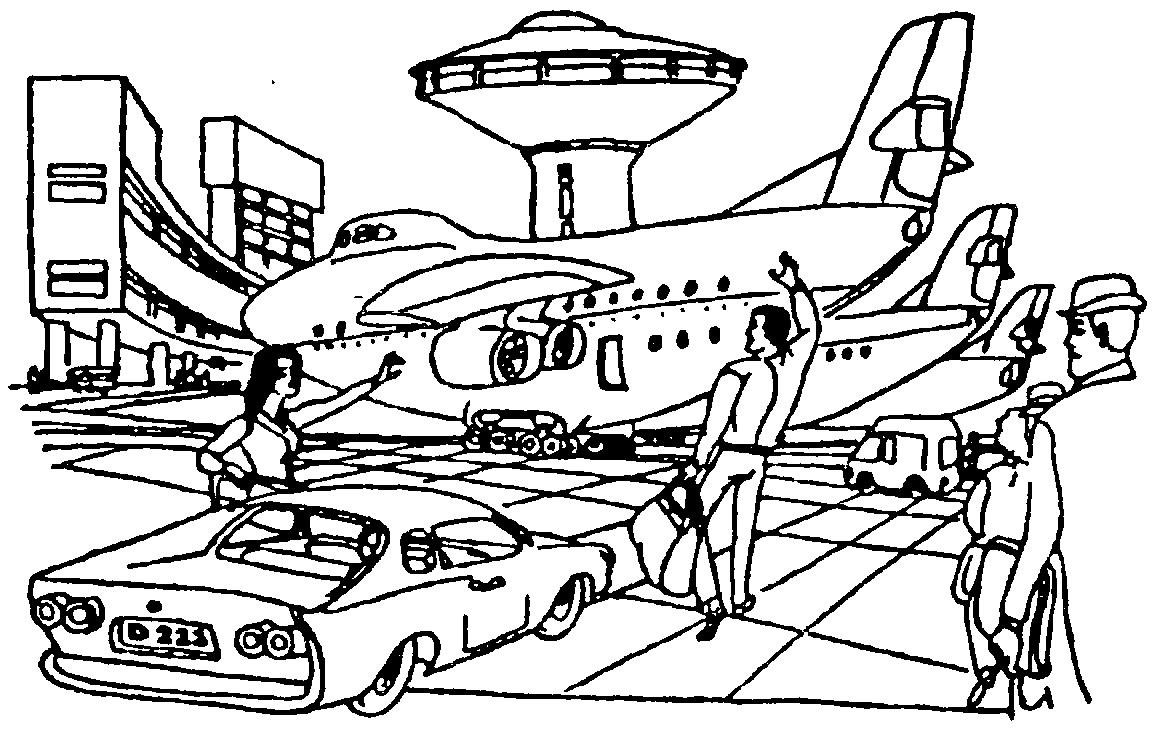 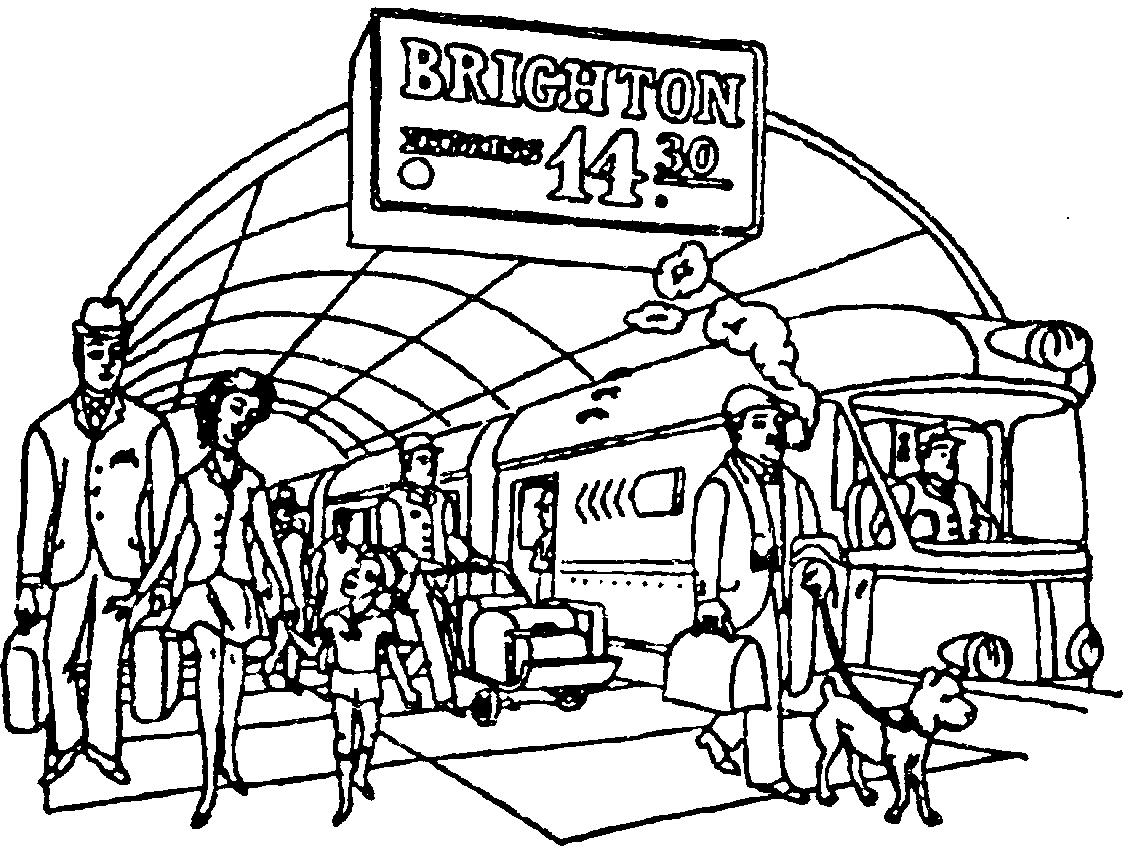 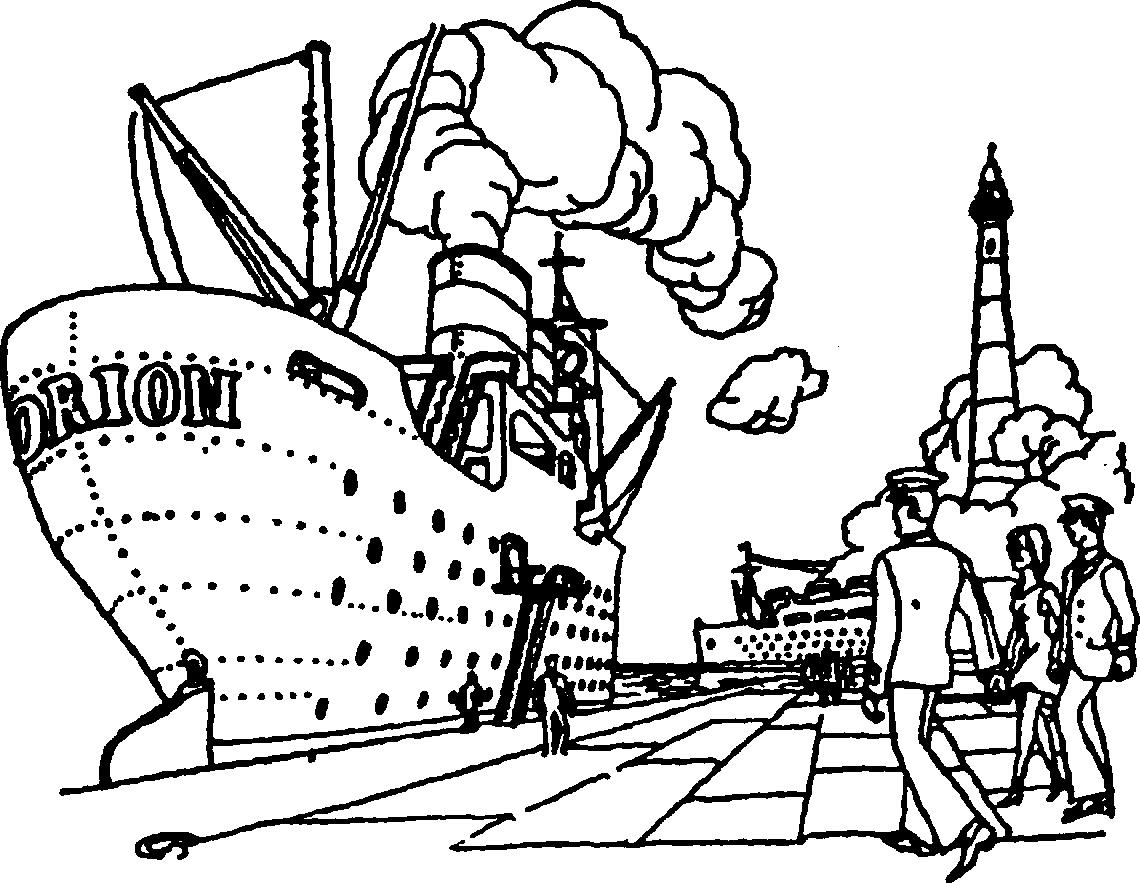 A.: And that is? C: A big sea port, For me there is no travel so fine as by boat. I love to feel the deck of the boat under my feet, to see the rise and fall of the waves, to feel the fresh sea wind blowing in my face and hear the cry of the sea-gulls. And what excitement, too, there is in coming into the harbour and seeing round us all the ships, steamers, cargo-ships, sailing ships, rowing boats. A.: Well, I suppose that's all right for those that like it, but not for me. I'm always seasick, especially when the sea is a little bit rough. В.: I've heard that a good cure for seasickness is a small piece of dry bread. A.: Maybe; but I think a better cure is a large piece of dry land. D a v i d : Well, you may say what you like about aeroplane flights, sea voyages, railway journeys or tours by car, but give me a walking tour any time. What does the motorist see of the country? But the walker leaves the dull broad highway and goes along little winding lanes where cars can't go. He takes mountain paths through the heather, he wanders by the side of quiet lakes and through the shade of woods. He sees the real country, the wild flowers, the young birds in their nests, the deer in the forest; he feels the quietness and calm of nature. And besides, you are saving your railway fare travelling on foot No one can deny that walking is the cheapest method of travelling, So I say: a walking tour for me. (From "Essential English for Foreign Students" by С. E. Eckersley, Book 4, Lnd., 1955) TEXT В. АТ ТНЕ STATION F.: Well, here we are at last! When I get into the boat-train,71 I feel that holidays have already begun. Have you got the tickets, Jan? J.: Yes, here they are. I booked seats for you and me; trains are usually crowded at this time. We have numbers A 26 and A 30; two corner-seats in a non-smoker, one seat facing the engine, one back to the engine. Is that all right? F.: That's very good, Jan. I don't like going a long journey in a smoker. May I sit facing the engine? J.: Of course! You can take whichever seat you like. As a matter of fact, I really prefer sitting with my back to the engine. Here's our carriage, A, and here's our compartment. You can get into the train now. F.: Lucy, won't you come into the carriage with me? You will be wanner inside. L: Thanks, I will. J.: I'll go and see that our luggage has been put into the guard's van, and I'll book two seats in the restaurant car for lunch. I'll get some newspapers at the bookstall and some chocholate on my way back. (He goes away.) L.: Jan is a good fellow for getting things done, isn't he? F.: He is. I don't know anyone better. I'm very glad he is coming with me. I know that I shall have a very comfortable journey. Jan will see to everything — find the seats on the train, see that my luggage is all right, and get it through the customs. I shan't have to do anything at all except sit back and enjoy the journey. (from "Essential English for Foreign Students" by С. Е. Eckersley, Book 2. Lnd., 1977) TEXT С. A VOYAGE ROUND EUROPE L.: Hello, Anne. Are you back from your holidays already? Ooo, you're lovely and brown! Where have you been? A.: Oh, I've had a fantastic timeJ I've just been on a cruise round Europe with my Dad. L.: Oh, you lucky thing! You must have seen so many interesting places. Where did you sail from? A.: Well, we left from Odessa... L.: Did you call at any European ports? A.: Yes. Quite a lot. We went ashore at each one and went on some really interesting trips sightseeing. L.: Did you go by train or did you hire a car? A.: No, we went by coach.72 Now I can say I've seen Rome, London, Paris and Athens. L.: Ooo, I'm so envious. Were you ever seasick? A.: Only a little, I was fine, until two days after Gibraltar, The sea suddenly became very rough, and I had to stay in my cabin. L.: What a shame. But was your father all right? A.: Yes, he was fine all the time. He's never seasick, L.: Did you go ashore when you reached Spain? A.: No, we only saw the coast-line from the deck. It didn't really look very inviting, a bit bare and monotonous, in fact. L.: And did you go for a swim in the Mediterranean? A.: Yes, and in the Atlantic Ocean too. There are some beautiful beaches on the west coast of France, It's so nice to have a swim there. L: Well, I'm glad you've had such a lovely time! Memory Work From a Railway Carriage Faster than fairies, faster than witches, Bridges and houses, hedges and ditches; And charging along like troops in a battle, All through the meadows, the horses and cattle; All of the sights of the hill and the plain Fly as thick as driving rain; And ever again, in the wink of an eye, Painted stations whistle by. Here is a child who clambers and scrambles, All by himself and gathering brambles; Here is a tramp who stands and gazes; And there's the green for stringing the daisies! Here is a cart run away in the road, Lumping along with man and load; And here is a mill and there's a river; Each a glimpse and gone for ever! Robert L. Stevenson NOTES ON SYNONYMS The act of travelling can be described by a number of synonyms which differ by various implications (see Notes on Synonyms, p. 18). They all describe the act of going from one place to another (that is why they are synonyms), but differ by the length of time taken by that act, by its purpose, destination or by the method of travelling. travel n: the act of travelling, esp. a long one in distant or foreign places, either for the purpose of discovering something new or in search of pleasure and adventure. (Freq. in the plural.); е.g. He is writing a book about his travels in Africa. journey n: the act of going from one place to another, usually taking a rather long time; е.g. It's a three days' journey by train. You'll have to make the journey alone. Going on a journey is always exciting. voyage n: a rather long journey, esp. by water or air; е.g. I'd love to go on a voyage, would you? The idea of an Atlantic voyage terrified her: she was sure to be seasick all the time. trip n: a journey, an excursion, freq. a brief one, made by land or water; е.g. Did you enjoy your week-end trip to the seaside? tour n: a journey in which a short stay is made at a number of places (usu. with the view of sightseeing), the traveller finally returning to the place from which he had started; е.g. On our Southern-England tour we visited Windsor, Oxford, Cambridge, Stratford-on-Avon and then came back to London. cruise n [kni:z]: a sea voyage from port to port, esp. a pleasure trip; е.g. The Mediterranean cruise promised many interesting impressions. hitch-hiking n: travelling by getting free rides in passing automobiles and walking between rides; е.g. Hitch-hiking is a comparatively new way of travelling which gives one a chance to see much without spending anything. ESSENTIAL VOCABULARY (П) Words booking-office n journey n smoker cabin n hitch-hiking n (smoking-car) n cargo-ship n luggage n speed n cruise n luggage-van n steamer n deck n porter n tour n dining-car n rough adj travel n engine n sail υ trip n fare n sea-gull n voyage n flight n seasickness n walker n guide n sleeper (sleeping-car) n wave n Word Combinations to go on a journey, trip, to travel second/standard voyage, a package tour class to travel by air (train, to call at a port boat, cruiser, liner, etc.) to go ashore to change from train to boat, bad (good) sailor (cruiser, liner) to make a trip, journey (But: to change for a boat. on deck Also: Where do I change for on shore Paris?) to look inviting to be seasick, to be travelsick to be due at (a place) (in any kind of transport) direct/through train single ticket you can't beat the train return ticket (return berth) a home lover/stay-at-home/ to travel/go first class a home-stay type EXERCISES I. Answer the questions. Be careful to argue your case well:1. What means of travel do you know? 2. Why are many people fond of travelling? 3. Why do some people like travelling by train? 4. Do you like travelling by train? What makes you like/dislike it? 5. What are the advantages of a sea-voyage? 6. What are the advantages of hitch-hiking? 7. What kind of people usually object to travelling by sea? 8. What are the advantages and disadvantages of travelling by air? Have you ever travelled by air? How do you like it? 9. What do you think about walking tours? 10. What is, in your opinion, the most enjoyable means of travel? 11. What way of travelling affords most comfort for elderly people? (Give your reasons.) 12. Do you think travel helps a person to become wiser? II. Fill in appropriate words (consult the list of synonyms on pp. 291— 292):.I. I'd be delighted to go on a sea .... but my wife has never been a good sailor, so we can't join you. 2. Last week we made a wonderful ... to the mountains. It took us four hours ??? стр 294 задания 3-6 пропущены? во всех книгах??? Nina: And where did you go ... ashore? Alex: Oh, ... some spot you are not likely to find ... any map. Well, when we found ourselves ... the bank we immediately started ... the place where our expediton was working. Nina: Did you go ... car? Alex: Oh, no! No car could have driven ... those paths. We travelled partly... foot, and ... some places went... small rivers and streams ... rowing-boats. We were ... spots where no man's foot had stepped ... us. Nina: How exciting! So you enjoyed ... the journey, didn't you? Alex: Every minute ... it, though it was not an easy one. Nina: Did you return ... air? Alex: No,... train. The fact is, I had hardly enough money ... the railway fare, not to say anything ... the plane. VII. Role-playing.Work in groups of four or five:You are a family deciding on the type of holiday you will go on next summer. Then report to the other families on your final decision, explaining the reasons for your choice. Point out advantages and disadvantages, giving warning based on personal experience. VIII. Translate the following into English:1. В какие порты будет заходить «Победа»? Зайдет ли она в Дувр? 2. Я не очень люблю морские путешествия. Я плохо переношу море и всегда страдаю морской болезнью. 3. Сегодня вечером наш пароход зайдет в Неаполь. Там мы пересядем в поезд и завтра будем в Риме. 4. Он не мог позволить себе ехать на поезде. Плата за проезд была слишком высока. Домой он добирался пешком и на попутных машинах. 5. В прошлом месяце группа наших студентов совершила интересную поездку по Англии. 6. Море было бурное, и несколько дней пассажиры не выходили из кают. Некоторые из них накануне хвастали, что не знают, что такое морская болезнь. Но и они не показывались на палубе. 7. Свое первое путешествие он совершил на борту старого грузового судна, направлявшегося в Европу. 8. В поезде был всего лишь один спальный вагон, в котором не было ни одного свободного места. Вагона-ресторана не было совсем. Начало поездки нельзя было считать удачным. 9. У вас есть билет на поезд прямого сообщения? Терпеть не могу пересадок, особенно если много багажа. IX. Make up dialogues.Suggested situations: A. Two friends are discussing different ways of spending their holidays. They both want to travel, but one of them is an enthusiast ready for anything and the other is a cautious and a sceptical person. (Use the following: there is nothing like travel by air/by sea, etc., it is more convenient to ...; there is none of the ...; speed, comfort and pleasure combined; there is no travel so fine as by...; the rise and fall of the waves; coming in to the harbour, that's all right for those that like it; when the sea is rough; hitch-hiking; it's risky, isn't it! I prefer to be on the safe side; I'd rather stay at home.) B. A person who has just returned from a foreign cruise is answering the questions of an eager listener. (Use the following: a most exciting experience; I really envy you; do tell me all about it, where did you sail from? what were your ports of colli go ashore; go sightseeing; what was the place that impressed you most! I didn't think much of...; the journey was tiring; but you did enjoy it, didn't you!) C. An old lady is talking to a porter at the railway platform. She keeps forgetting the name of the place she is going to and does not quite know how many pieces of luggage she has. (Use the following: will you see to my luggage? where for, madam? it just slipped my memory, it's a sort of resort place; would you like me to have these trunks put in the luggage-van? where on earth is that suitcase? it will never go on the luggage-rack; I must have a seat facing the engine; dear me, I'm sure to miss the train; is it a through train? I hate to change; when are we due to arrive?) X. а) Translate the following fragment into Russian inwritten form:When your ship leaves Honolulu they hang 'leis' round your neck, garlands of sweet-smelling flowers. The wharf is crowded and the band plays a melting Hawaiian tune. The people on board throw coloured streamers to those standing below, and the side of the ship is gay with the thin lines of paper, red and green and yellow and blue. When the ship moves slowly away the streamers break softly, and it is like the breaking of human ties. Men and women are joined together for a moment, by a gaily coloured strip of paper, red and blue and green and yellow, and then life separates them and the paper is sundered, so easily, with a little sharp snap. For an hour the fragments trail down the hull and then they blow away. The flowers of your garlands fade and their scent is oppressive. You throw them overboard. (From "The Trembling of a Leaf" by W. S. Maugham) b) Compare the seeing-off ceremony described in the fragment with the one you read about in the story "Seeing People Off". c) Comment on the second part of the fragment beginning with the wordg "...it is like the breaking of human ties". What does the description symbolize? Comment on the stylistic aspect of the fragment. XI. a) Read the text below and translate it into Russian orally:A Sea Trip "No", said Harris, "if you want rest and change, you can't beat a sea trip." I objected to the sea trip strongly. A sea trip does you good when you are going to have a couple of months of it, but, for a week, it is wicked. You start on Monday with the idea that you are going to enjoy yourself. You wave an airy adieu to the boys on shore, light your biggest pipe and swagger about the deck as if you were Captain Cook, Sir Francis Drake, and Christopher Columbus all rolled into one. On Tuesday you wish you hadn't come. On Wednesday, Thursday and Friday, you wish you were dead. On Saturday you are able to swallow a little beef tea, and to sit up on deck, and answer with a wan, sweet smile when kind-hearted people ask you how you feel now. On Sunday, you begin to walk about again, and take solid food. And on Monday morning, as, with your bag and umbrella in your hand, you stand by the gangway, waiting to step ashore, you begin to thoroughly like it. I remember my brother-in-law going for a short sea trip once for the benefit of his health. He took a return berth from London to Liverpool; and when he got to Liverpool, the only thing he was anxious about was to sell that return ticket. It was offered round the town at a tremendous reduction; so I am told; and was eventually sold for eighteen pence to a youth who had just been advised by his medical man to go to the seaside, and take exercise. "Seaside!" said my brother-in-law, pressing the ticket affectionately into his hand; "why, you'll get enough to last you a lifetime; and as for exercise! why, you'll get more exercise, sitting down on that ship, than you would turning somersaults on dry land. He himself — my brother-in-law — came back by train. He said the North-Western Railway was healthy enough for him. (From "Three Men in a Boat" by Jerome K. Jerome. Adapted) b) Answer the following questions:1. What made the narrator object to the sea trip? 2. Why did his brother-in-law sell his return ticket? 3. How did he describe the advantages of a sea trip to the youth who bought his ticket? c) Point out the Hues and passages that you consider humorous. Is it humour of situation or humour of words! (Analyse each case separately.)XII. Speak individually or arrange a discussion on the following:1. What attracts people in the idea of travelling? 2. Is the romantic aspect of travelling still alive in our time? 3. The celebrated travellers of the past. 4. Where and how would you like to travel? ХIII. Try your hand at teaching.1. Arrange and run aconversation on the following text:The Only Way to Travel Is on Foot When anthropologists turn their attention to the twentieth century, they will surely choose the label "Legless Man". Histories of the time will go something like this: "In the twentieth century people forgot how to use their legs. Men and women moved about in cars, buses and trains from a very early age. The surprising thing is that they didn't use their legs even when they went on holiday. They built cable railways, ski-lifts and roads to the top of every huge mountain." The future history books might also record that we did not use our eyes. In our hurry to get from one place to another, we failed to see anything on the way. Air travel 0ves you a bird's-eye view of the world. Car drivers in particular, never want to stop. The typical twentieth-century traveller is the man who always says 'I've been there' — meaning, "I drove through it at 100 miles an hour on the way to somewhere else." When you travel at high speeds the present means nothing: you live mainly in the future, because you spend most of your time looking forward to arriving at some other place. But actual arrival when it is achieved, is meaningless. You want to move on again. The traveller on foot, on the other hand, lives constantly in the present. He experiences to present moment with his eyes, his ears and the whole of his body. At the end of his journey he feels a delicious physical weariness. He knows that sound satisfying sleep will be his: the just reward of all true travellers. 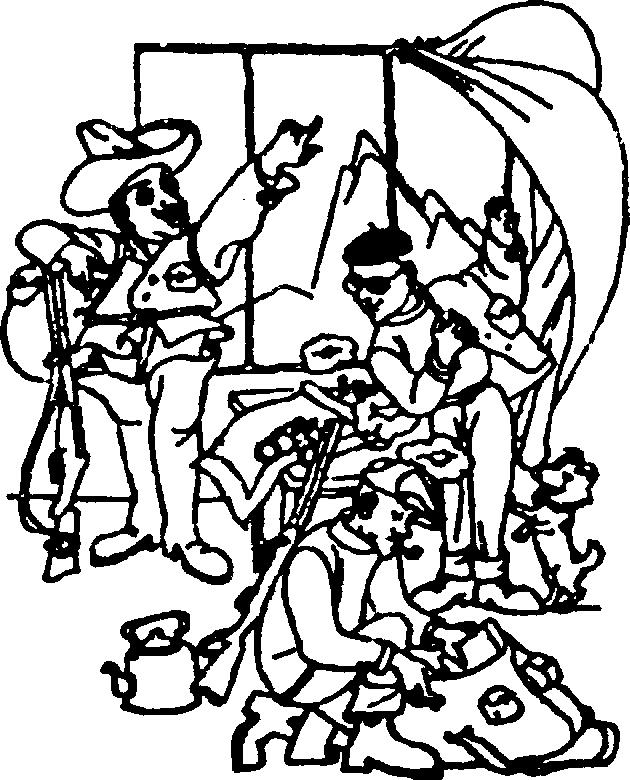 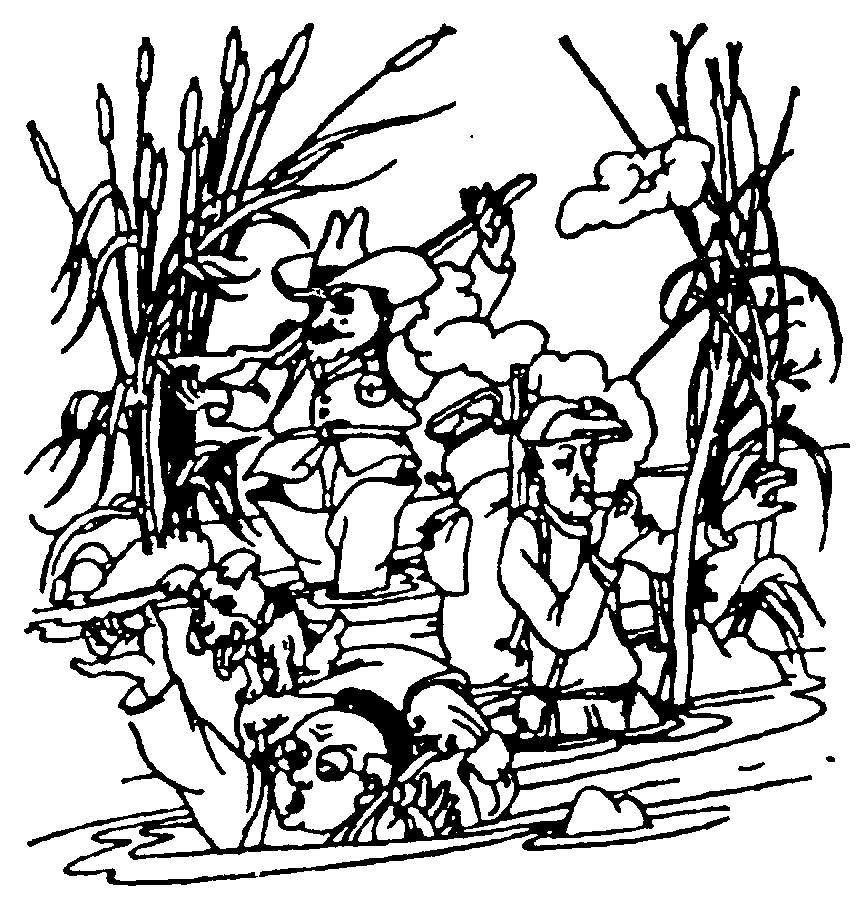 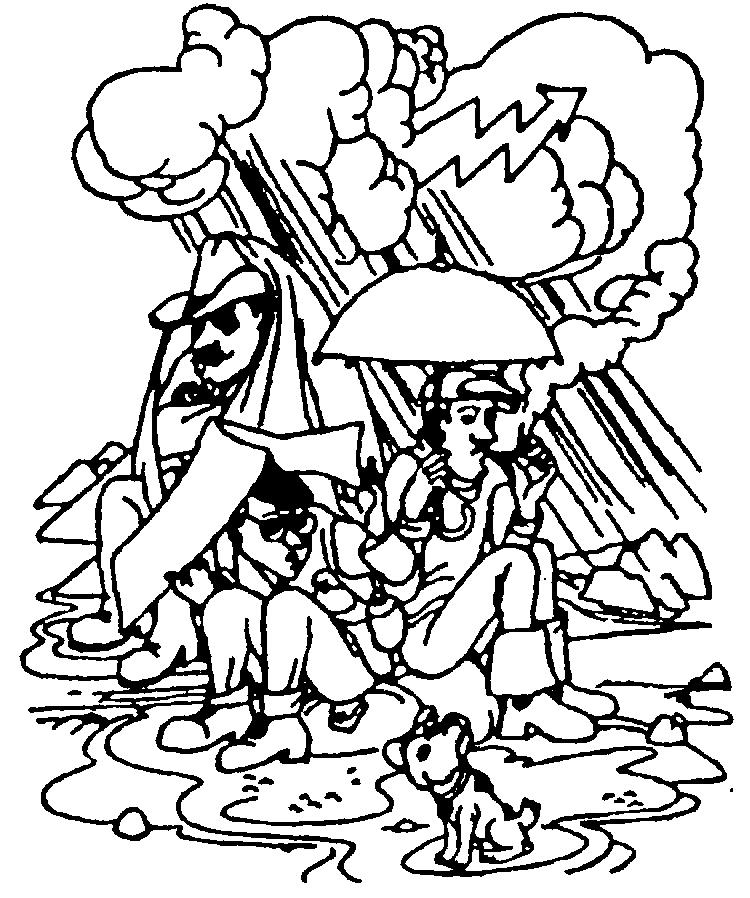 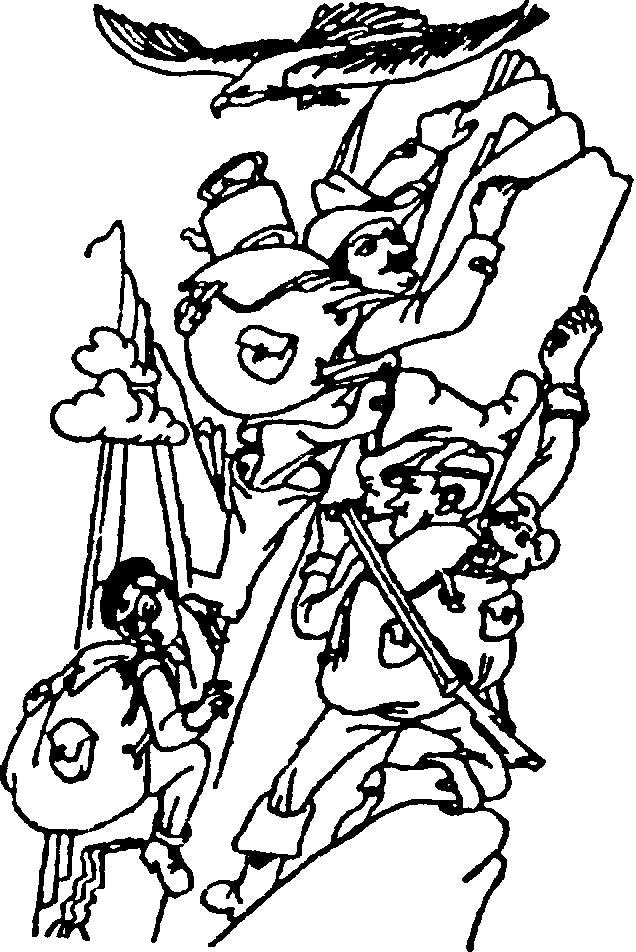 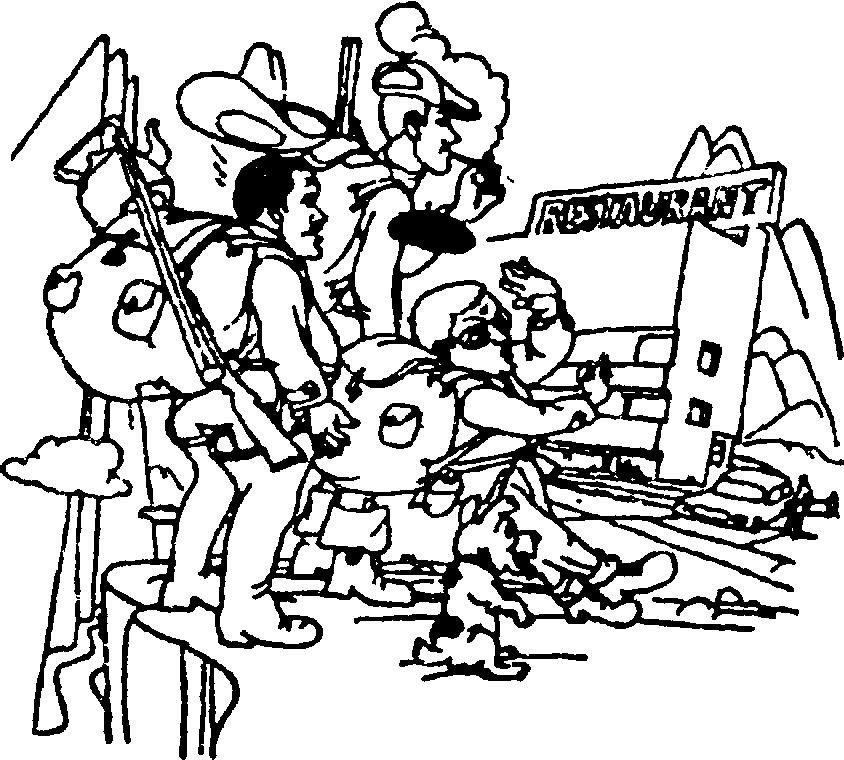 Arguments:
2. Think of some other arguments and counter-arguments to carry on the discussion. (See "Classroom English", Section IX.) XIV. A. Do yon know how to act sensibly when out in the wilds? If not, the text below might help you:If you are setting off on a walking tour, take a compass, a map and first-aid equipment with you. Even the most experienced can lose their way in the vast uninhabited areas. If you get lost don't lose your head. Instead be sensible, try to give some indication of where you are and keep yourself warm. And remember: never go off alone, and inform someone at your point of departure where you intend to go, and what route you intend to take. B. Describe the pictures. Use the suggested phrases.С See if the travellers have acted sessibly. Support your idea.a) give me a walking tour every time; you can't beat (hitch-) hiking; need you take so much luggage? b) to get to wild, uninhabited places; to be hardly able to go on; to be nearly drowned in a swamp; unimaginable hardships; to overcome the obstacles; c) there was a turn in the weather, it was pouring; flashes of lightning, rolls of thunder, I wish I were in a railway carriage now!; d) to climb the steepest rocks; to face the danger of...; to get to places where no man's foot has ever stepped; e) to reach the top in safety, to be hardly able to believe one's eyes; you could knock me down with a feather. STUDIES OF WRITTEN ENGLISH VIII Different patterns of writing (see "Studies" in Unit One) seldom occur alone, more often they blend into one another, especially in letter writing. Letter is a specific kind of written composition involving a concrete writer, message and a concrete reader. In many ways it is a free composition. A letter is in a sense, a theme, governed by the same rules of writing that govern every other kind of composition. It must be clear, well organized, coherent. And it should be interesting. But a letter is also governed by certain other laws, or conventions of usage, which the letter writer cannot ignore. These are the parts of a letter: the heading, the inside address, the greeting, the body of the letter, the complimentary close, the signature. For each of these parts usage has prescribed certain set forms depending on different types of letters — personal or business letters, informal or formal social notes. The heading. The parts of a heading, written in the following order, are the street, address, the name of a city or town (the name of the state in the U.S.A.), the date, е.g. Vine Cottage Oxford Road Abingdon-on-Thames 13 May 19... N о t e: In Great Britain very often the house is not numbered but has a "proper" name, like "Vine Cottage", The inside address. In a business letter the inside address is the address of the person written to. In personal letter the inside address is usually omitted. In a business letter it is always correct to use a personal title with the name of the person addressed. A business title should not precede the name. Correct personal titles are: Mr., Mrs., Miss, Dr., Professor, Messrs., е.g. Dr. Т. С Howard Superintendent of Schools The Greeting. The following forms are correct for business and professional letters: Gentlemen: Ladies: Dear Sir: Dear Madam: My dear Sir. My dear Madam: Dear Mr. Warren: Dear Miss Howard: In personal letters either a colon or a comma may be used after the greeting. A comma is considered less formal. In personal letters the range of greetings is unlimited and informal, like "My own Lovey-Dovey" of Judy's "Dear Daddy Long-Legs". The Body of the Letter. A good letter should be clear, direct, coherent, dignified and courteous. The Complimentary Close. Correct forms for business letters are: Yours truly, Yours very truly, Very truly yours, Respectfully yours, Faithfully yours. Sincerely yours, Yours sincerely, Cordially yours. The Signature. Some of the conventions should be observed: a) neither professional titles, nor academic degress should be used with a signature; b) an unmarried woman should sign herself as Miss Laura Blank, but she may place Miss in parentheses before her name if she feels that it is necessary for proper identification; c) a married woman or a widow signs her own name, not her married name. For example, Diana Holiday Brown is her own name; Mrs. George Brown is her married name, Here is an example of a business letter: Dear Miss Carnaby, Allow me to enclose a contribution to your very deserving Fund before it is finally wound up. Yours very truly, Hercule Poirot. Assignments: 1. Go over the letters (see Unit Five) and copy down the samples of the complimentary close. 2. Write a reply to Judy's letter as if you were the person she wrote her letter to. 3. Write a letter to a friend sharing the memories of your holiday trip and your feelings at the station on the day of departure. 4. Write a letter to your dean in which you request permission to stay at your parents' several days more. Give your reason clearly and convincingly. XV. Film "Mr. Brown's Holiday". Film Segment 8 "Caught in the Rain" (On the Way to Yeovil). a) Watch and listen, b) Do the exercises from the guide to the film. LABORATORY EXERCISES (II) 1. Listen to the text "Different Means of Travel", mark the stresses and tunes. Repeat it following the model. 2. Listen to the conversation "At the Station", mark the stresses and tunes; repeat after the tape, learn the text by heart. 3. Listen to the dialogue "A Voyage Round Europe", mark the stresses and tunes. Repeat the text following the model and record your variant. Compare your variant with the model and correct your pronunctalion mistakes. 4. Write a spelling-translation test: a) translate the phrases into English; b) check them with the key. 5. Listen to some text on the topic "Trawelling", Retell it in class. 6. Listen to some anecdotes. Put down the word combinations you find useful. Act them out in class (oral and written work). 7. Listen to the poem "From a Railway Carriage". Mark the stresses and tunes. Repeat after the tape. Learn it by heart. CURIOSITY QUIZ FOR EAGERS What do you know about 1. Christopher Columbus and the history of his discovery? Why wasn't America named in his houour? After whom was it named and why? 2. Captain Cook, Sir Francis Drake, Roald Amundsen, Mlckloukha-Macklay, the Papanin expedition? 3. The Mystery of the Atlantis, the Mystery of the Bennudian Triangle, the Mystery of the Easter Isle, the Loch Ness Monster? |
